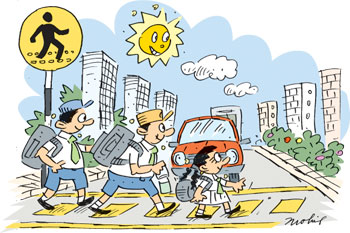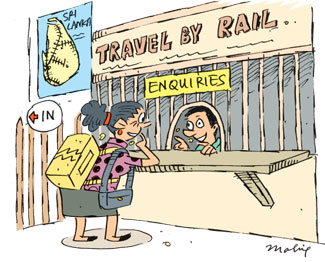|

by R. S. Karunaratne
Correct usage of 'according
to' and 'across'
'According to' is used when you have external evidence to support a
statement.
According to Aristotle, man is a rational animal.
|

WORD POWER |
Planet Earth will also perish one day according to scientists.
The robbers had come wearing masks, according to the security guards.
According to the Controller, all the trains will be delayed today.
'According to' is sometimes used to refer to statistics and official
reports.
According to the weather report, there will be thunder and lightning
followed by rain in most parts of the island.
According to a report by two medical experts, many children are
suffering from diabetes.
According to military sources LTTE cadres are regrouping themselves
in foreign countries.
'According to' is not used when you refer to yourself. Therefore,you
cannot say, According to me, all these figures are wrong.'
Say: In my opinion, all these figures are wrong.
'According to' is used to mean 'in harmony with' or 'in line with.'
We are putting up the new building according to plan.
Everything happened according to my wishes.
Have the police acted according to the law?
Employees get promotions according to their experience and
commitment.
Prices of goods vary according to quality.
'In accordance with' is a phrase used in formal English.
The courts will act in accordance with the law.
|

According to the Controller, all the trains will be delayed
today. |
'Across'
'Across' is a preposition.
Schoolchildren walked across the playground.
There is a road running across the village.
Never use 'across' as a verb. The verb is 'cross.'
If you want to cross the road, use the pedestrian crossing.
'Across' is used to show position.
I sat facing the interviewer across a big table.
'Across' and 'over' are sometimes used synonymously.
Children walked across/over the newly-built bridge.
Current English usage
Being a living language, English is subject to change from time to
time. Here's help for you to be in touch with the latest changes.
1. Colour and discoloration
The 'u' found in 'colour' is not found in 'discoloration.'
2. Disinterested and uninterested
In modern usage both words mean 'not interested' or 'indifferent.'
'Disinterested' also means 'impartial' or 'unbiased.'
3. Disassociate and dissociate
Both words are used interchangeably. However, 'dissociate' is the
more usual. The director dissociated himself from the statement issued
by the company.
4. Distinct and distinctive
'Distinct' means 'definite.' Shyama got the distinct impression that
she would get the job. Distinctive means 'distinguishing.' The thumb
impression has distinctive markings.
5. Doubtful and dubious
Both words mean 'giving rise to doubt' or 'uncertain.' She was
doubtful / dubious about the outcome of the new project. 'Dubious' has
the additional meaning of 'possibly dishonest or bad.'
6. Downward and downwards
'Downward' is an adjective. A few huts could be seen on the downward
slope of the mountain. 'Downwards' is an adverb. Don't look downwards
from the top of the mountain.
7. Draft and draught
'Draft' is a 'preliminary version.' Give me a rough draft of your
proposals. 'Draught' is 'a current of air.' There was a cool draught
coming through the window.
8.Draughtsman and draftsman
'Draughtsman' is a person who prepares detailed plans of a building.
'Draftsman' is a person who prepares a preliminary version of a plan.
9. Dreamed and dreamt
Both words are used as the past tense and the past participle of the
verb 'dream.'
I have dreamed/dreamt the same dream for several days.
10. Drier and dryer
Both words mean a machine or appliance that dries. Do you use a
hair-drier/hair-dryer? As an adjective 'drier' is the usual word.
11. Drunk and drunken
'Drunk' is used when somebody is temporarily intoxicated. The drunk
man reached home late at night. 'Drunken' is used to describe someone
who is in the habit of getting intoxicated, Drunken men came out of the
hotel one after the other.
Starters :
How to use 'the'
with proper nouns
'The' is used before some proper nouns.
1. Use 'the' before the names of oceans, rivers, seas and straits.
The Indian ocean
The (River) Mahaweli
The Caspian Sea
The Palk Straits
2. Use 'the' before the names of most buildings, landmarks, monuments
and natural wonders.
The Hilton Hotel
The Empire State Building
The Taj Mahal
The Grand Canyon
3. Use 'the' before the names of places containing 'of'.
The Democratic Socialist Republic of Sri Lanka
The University of Sri Jayewardenepura
4. Use 'the' before the names of places ending in plural 's'.
The Maldives
The Netherlands
Exceptions
We do not use 'the' before some proper nouns.
(a) The names of continents
Asia, Africa, Australia, America
(b) The names of most countries
England, Japan, India
(c) The names of most towns and cities
Colombo, Bangalore, Tokyo
(d) The names of streets
Main Street, Vauxhall Street, Armour Street
(e) The names of people
Norton, Alexander, Lionel, Shakespeare.
Activity
Fill in the blanks with 'a, an, the"or" ...." (no article), check
your answers with the key.
1. ..... boy has .... knife.
2. John is wearing .... man's shirt
3. Grace sang .... song at .... concert.
4. George is .... boy
5. .... teacher spoke to .... John and Margaret.
6. .... teacher gave me .... English lesson.
7. He told me .... story.
8. Mary is in .... class.
9. .... dog jumped over .... gate.
10. Ships sail in .... Indian Ocean.
**************
Key
1. The boy has a knife.
2. John is wearing a man's shirt.
3. Grace sang a song at the concert.
4. George is a boy.
5. The teacher spoke to - John and Margaret.
6. The teacher gave me an English lesson.
7. He told me a story.
8. Mary is in the class.
9. The dog jumped over the gate.
10. Ships sail in the Indian Ocean.
**************
Spelling rules
The adjectives of words with '-ion', '-tion', '-ive' will end in
'-ible'.
audition : audible
Combustion : combustible
Conversion : convertible
Defensive : defensible
Digestive: : digestible
Repressive : irrepressible
Perception : perceptible
Reversion : reversible
Here is a list of useful adjectives ending in '-able' and
'-ible'.
Affable, attributable, enforceable, equitable, indubitable,
inscrutable, remediable, venerable, compatible, deducible, discernible,
expressible, flexible, incorrigible, invincible, tangible. |

